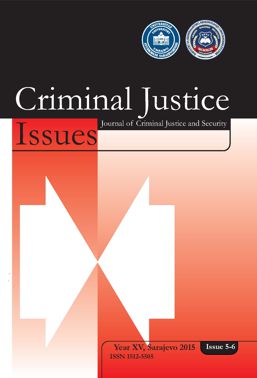ASSESSMENT AND TREATMENT OF WAR TRAUMA
ASSESSMENT AND TREATMENT OF WAR TRAUMA
Author(s): Laurence A. French, Goran Kovačević, Lidija Nikolić-Novaković, Bakir AlispahićSubject(s): Military history, Cognitive Psychology, Psychology of Self, Clinical psychology, Behaviorism, Studies in violence and power, Health and medicine and law, Transformation Period (1990 - 2010)
Published by: Fakultet za kriminalistiku, kriminologiju i sigurnosne studije Univerziteta u Sarajevu
Keywords: War trauma; PTSD; MMPI; MSE; screening; assessment;
Summary/Abstract: Reason(s) for writing and research problem(s): The Yugoslavian breakup wars beginning in the early 1990s resulted in many common unresolved war-trauma issues. Common to these conflicts, whether it be Bosnia Herzegovina, Croatia, Serbia, Kosovo, or Macedonia is the unmet need of both military veterans and civilian casualties suffering with either physical or psychological injuries, or both. Aims of the paper (scientific and/or social): The scientific and social aim is to offer valuable methodology for estimate of the presence of War trauma in respective societies and propose the best possible approach in assessing the scope of the problems. Methodology/Design: The authors developing assessment protocols with a number of them translated into the Bosnian and Serbian language so that they could be used within those nations most closely involved in the Balkan Wars of 1991-2002. Validity will be established by administering the predictor (like the MMPI) to all applicants/candidates and then later assessing the scores/profiles with those who are successful or who failed the program. Research/paper limitations: The proposed methodological approach as explained in this paper is a profile based research and it is constructed for and limited to assessment of War trauma and using it for other purposes could give one false data and interpretations. Results/Findings: The paper analyze the best fit methodology for respective societies and results. In other countries where similar research was administered, results were the blueprint for state policy development in the fields of Societal security, radicalization, social deviations and victimization. General conclusion: The idea behind this paper is to explain sophisticated scientific approach to analysis of societal trends and to develop the best procedures for neutralizing the effects of detected negative societal trends in local communities. Research/paper validity: Validity is established by administering the predictor (like the MMPI) to all applicants/candidates and then later assessing the scores/profiles with those who are successful or who failed the program.
Journal: Kriminalističke teme – Časopis za kriminalistiku, kriminologiju i sigurnosne studije
- Issue Year: XV/2015
- Issue No: 5-6
- Page Range: 35-48
- Page Count: 14
- Language: English

